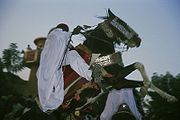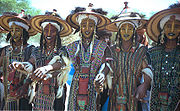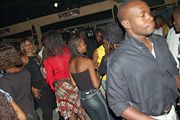
Culture of Niger
Encyclopedia



Niger
Niger , officially named the Republic of Niger, is a landlocked country in Western Africa, named after the Niger River. It borders Nigeria and Benin to the south, Burkina Faso and Mali to the west, Algeria and Libya to the north and Chad to the east...
is marked by variation, evidence of the cultural crossroads which French colonialism
French colonial empires
The French colonial empire was the set of territories outside Europe that were under French rule primarily from the 17th century to the late 1960s. In the 19th and 20th centuries, the colonial empire of France was the second-largest in the world behind the British Empire. The French colonial empire...
formed into a unified state from the beginning of the 20th century. What is now Niger was created from four distinct cultural areas in the pre-colonial era: the Djerma
Djerma
The Zarma people , are a people of westernmost Niger and adjacent areas of Burkina Faso, Benin, Ghana and Nigeria. The Zarma language is one of the Songhai languages, a branch of the Nilo-Saharan language family...
dominated Niger River
Niger River
The Niger River is the principal river of western Africa, extending about . Its drainage basin is in area. Its source is in the Guinea Highlands in southeastern Guinea...
valley in the southwest; the northern perephery of Hausaland, made mostly of those states which had resisted the Sokoto Caliphate, and ranged along the long southern border with Nigeria
Nigeria
Nigeria , officially the Federal Republic of Nigeria, is a federal constitutional republic comprising 36 states and its Federal Capital Territory, Abuja. The country is located in West Africa and shares land borders with the Republic of Benin in the west, Chad and Cameroon in the east, and Niger in...
; the Lake Chad
Lake Chad
Lake Chad is a historically large, shallow, endorheic lake in Africa, whose size has varied over the centuries. According to the Global Resource Information Database of the United Nations Environment Programme, it shrank as much as 95% from about 1963 to 1998; yet it also states that "the 2007 ...
basin and Kaouar
Kaouar
The Kaouar, or Kaouar Cliffs is a north-south escarpment running some 150 km in north east Niger. Surrounded by the Ténéré desert and the dunes of the Erg of Bilma, easterly winds striking the 100 meter high escarpment of Kaouar provide easy access to groundwater for ten oases on the leeward side...
in the far east, populated by Kanuri farmers and Toubou
Toubou
The Tubu are an ethnic group that live mainly in northern Chad, but also in Libya, Niger and Sudan....
pastoralists who had once been part of the Kanem-Bornu Empire
Bornu Empire
The Bornu Empire was an African state of Nigeria from 1396 to 1893. It was a continuation of the great Kanem Empire founded centuries earlier by the Sayfawa Dynasty...
; and the Tuareg nomads of the Aïr Mountains
Aïr Mountains
The Aïr Mountains is a triangular massif, located in northern Niger, within the Sahara desert...
and Saharan
Saharan
The term Saharan is used in the English language to denote someone or something from the Sahara desert, including:* Sahrawi , referring to the people of the Western Sahara* Saharan languages, a subgroup of the Nilo-Saharan languages...
desert in the vast north. Each of these communities, along with smaller ethnic groups like the pastoral Wodaabe
Wodaabe
The Wodaabe or Bororo are a small subgroup of the Fulani ethnic group. They are traditionally nomadic cattle-herders and traders in the Sahel, with migrations stretching from southern Niger, through northern Nigeria, northeastern Cameroon, and the western region of the Central African Republic....
Fula
Fula people
Fula people or Fulani or Fulbe are an ethnic group spread over many countries, predominantly in West Africa, but found also in Central Africa and Sudanese North Africa...
, brought their own cultural traditions to the new state of Niger.
In religion, Islam
Islam
Islam . The most common are and . : Arabic pronunciation varies regionally. The first vowel ranges from ~~. The second vowel ranges from ~~~...
, spread from North Africa
North Africa
North Africa or Northern Africa is the northernmost region of the African continent, linked by the Sahara to Sub-Saharan Africa. Geopolitically, the United Nations definition of Northern Africa includes eight countries or territories; Algeria, Egypt, Libya, Morocco, South Sudan, Sudan, Tunisia, and...
beginning in the 10th century, has greatly shaped the mores of the people of Niger. Since Independence, greater interest has been in the country's cultural heritage, particularly with respect to traditional architecture, hand crafts, dances and music.
Music of Niger includes the guitar music of the Tuaregs of Agadez
Agadez
-Sources:* Aboubacar Adamou. "Agadez et sa région. Contribution à l'étude du Sahel et du Sahara nigériens", Études nigériennes, n°44, , 358 p.* Julien Brachet. Migrations transsahariennes. Vers un désert cosmopolite et morcelé . Paris: Le Croquant, , 324 p. ISBN : 978-2-91496865-2.*. Saudi Aaramco...
as performed by Group Inerane, Group Bombino
Group Bombino
Group Bombino were a music group of Agadez, Niger led by Tuareg guitarist Omara Moctar and including some of the members of their associates Group Inerane....
and others.
National culture
While successive post-independence governments have tried to forge a shared national culture, this has been slow forming, in part because the major Nigerien communities have their own cultural histories, and in part because Nigerian ethnic groups such as the HausaHausa people
The Hausa are one of the largest ethnic groups in West Africa. They are a Sahelian people chiefly located in northern Nigeria and southeastern Niger, but having significant numbers living in regions of Cameroon, Ghana, Cote d'Ivoire, Chad and Sudan...
, Tuareg and Kanuri are but part of larger ethnic communities which cross borders introduced under colonialism. Until the 1990s, government and politics was inordinately dominated by Niamey
Niamey
-Population:While Niamey's population has grown steadily since independence, the droughts of the early 1970s and 1980s, along with the economic crisis of the early 1980s, have propelled an exodus of rural inhabitants to Niger's largest city...
and the Djerma
Djerma
The Zarma people , are a people of westernmost Niger and adjacent areas of Burkina Faso, Benin, Ghana and Nigeria. The Zarma language is one of the Songhai languages, a branch of the Nilo-Saharan language family...
people of the surrounding region. The French had promoted Djerma royalty under their rule. After having first placed their capital in the powerful pre-colonial Hausa state at Zinder
Zinder
Zinder is the second largest city in Niger, with a population of 170,574 by 2005 was estimated to be over 200,000...
, the French moved their administration to what was a small village at Niamey, in part from fear of pan-Hausa power or British imperial designs on southern Niger. This governmental focus on the southwest continued after independence, with political representation reverting to a tiny traditional and educated elite. Despite this, only the Tuareg and Toubou
Toubou
The Tubu are an ethnic group that live mainly in northern Chad, but also in Libya, Niger and Sudan....
pastoralists in the sparsely populated north and east have generated movements for autonomy, culminating in rebellions in 1963, the 1990s, and 2007. Islam, practiced by almost the entire population forms an important link between Nigerien communities, as does a shared post-independence history, national symbols, and festivals. See National symbols of Niger, Public holidays in Niger
Public holidays in Niger
The government and people of Niger observe twelve official public holidays. These include international commemorations, the commemoration of important dates in the history of Niger, and religious holidays. Both Christian and Muslim holidays are observed as official public holidays...
.
Religion
IslamIslam
Islam . The most common are and . : Arabic pronunciation varies regionally. The first vowel ranges from ~~. The second vowel ranges from ~~~...
is the dominant religion in Niger
Niger
Niger , officially named the Republic of Niger, is a landlocked country in Western Africa, named after the Niger River. It borders Nigeria and Benin to the south, Burkina Faso and Mali to the west, Algeria and Libya to the north and Chad to the east...
and is practiced by more than 90% of the population. Approximately 95% of Muslims are Sunni; 5% are Shi'a. There small Christian
Roman Catholicism in Niger
The Roman Catholic Church in Niger is part of the worldwide Roman Catholic Church, under the spiritual leadership of the Pope and curia in Rome....
, Bahá'í and Animist communities, the first largely a remnant of French colonial influence. Animist beliefs include both animist based festivals and traditions (such as the Bori
Bori
Bori is a town and arrondissement located in the N’Dali commune of the Borgou Department of Benin....
cult) practiced by some syncretic Muslim communities, as opposed to several small communities who maintain their pre-Islamic religion. These include the Hausa speaking Maouri/Azna
Azna
Azna is a city in and capital of Azna County, Lorestan Province, Iran. At the 2006 census, its population was 37,645, in 9,178 families.Azna is located in the Zagros Mountains.It currently serves as a refuge camp for the Faili Kurds....
community in Dogondoutci in the south-southwest, the Kanuri speaking Manga near Zinder, and some tiny Boudouma and Songhay communities in the southwest.
Language
While FrenchFrench language
French is a Romance language spoken as a first language in France, the Romandy region in Switzerland, Wallonia and Brussels in Belgium, Monaco, the regions of Quebec and Acadia in Canada, and by various communities elsewhere. Second-language speakers of French are distributed throughout many parts...
has been the cross cultural language of choice since independence, there are eight other official languages of Niger: Hausa
Hausa language
Hausa is the Chadic language with the largest number of speakers, spoken as a first language by about 25 million people, and as a second language by about 18 million more, an approximate total of 43 million people...
, Zarma / Songhai
Songhay languages
The Songhay, Songhai, or Songai languages are a group of closely related languages/dialects centered on the middle stretches of the Niger River in the west African states of Mali, Niger, Benin, Burkina Faso, and Nigeria. They have been widely used as a lingua franca in that region ever since the...
, Tamajeq
Tuareg languages
Tuareg is a Berber language or family of very closely related languages and dialects spoken by the Tuareg Berbers, in large parts of Mali, Niger, Algeria, Libya and Burkina Faso, with a few speakers, the Kinnin, in Chad.- Description :Other Berber languages and Tamashaq are quite mutually...
, Fulfulde
Fula language
The Fula or Fulani language is a language of West Africa. It is spoken as a first language by the and related groups from Senegambia and Guinea to Cameroon and Sudan...
, Kanuri
Kanuri language
Kanuri is a dialect continuum spoken by some four million people, as of 1987, in Nigeria, Niger, Chad and Cameroon, as well as small minorities in southern Libya and by a diaspora in Sudan. It belongs to the Western Saharan subphylum of Nilo-Saharan...
, Colloquial Arabic
Arabic language
Arabic is a name applied to the descendants of the Classical Arabic language of the 6th century AD, used most prominently in the Quran, the Islamic Holy Book...
, Gurmantche, and Toubou
Toubou
The Tubu are an ethnic group that live mainly in northern Chad, but also in Libya, Niger and Sudan....
. Hausa, which almost half the population speak, has come to rival French as most used across communities.
Sport
While traditional sports like horse racingHorse racing
Horse racing is an equestrian sport that has a long history. Archaeological records indicate that horse racing occurred in ancient Babylon, Syria, and Egypt. Both chariot and mounted horse racing were events in the ancient Greek Olympics by 648 BC...
, camel racing
Camel racing
Camel racing is a popular sport in India, Pakistan, Saudi Arabia, Egypt, Bahrain, Jordan, Qatar, United Arab Emirates, Oman, Australia, and Mongolia. Professional camel racing, like horse racing, is an event for betting and tourist attraction...
and sorro wrestling survive, world sports like football
Football in Niger
-International:While popular, Niger have so far been unsuccessful in international football, never winning a major tournament and failing to qualify for any FIFA World Cup finals, though they did reach the quarterfinals of qualifying in 1982, before losing to Algeria, who qualified for the 1982...
dominate in urban areas. In the 1972 Olympics, boxer
Boxing
Boxing, also called pugilism, is a combat sport in which two people fight each other using their fists. Boxing is supervised by a referee over a series of between one to three minute intervals called rounds...
Issake Dabore
Issake Dabore
Issaka Daborg is a former boxer from Niger, who won a bronze medal in the light welterweight division the 1972 Summer Olympics, his country's only Olympic medal so far. He also represented his country at the 1964 and 1968 Summer Olympics...
won a bronze medal
Bronze medal
A bronze medal is a medal awarded to the third place finisher of contests such as the Olympic Games, Commonwealth Games, etc. The practice of awarding bronze third place medals began at the 1904 Olympic Games in St...
, and Niger has sent athletes to all Summer Olympic Games held since 1964 except for 1976 and 1980.

